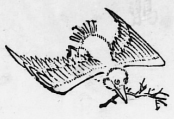Top Qs
Timeline
Chat
Perspective
Jingwei
Bird in Chinese mythology From Wikipedia, the free encyclopedia
Remove ads
Jingwei (traditional Chinese: 精衛; simplified Chinese: 精卫; pinyin: Jīngwèi; Wade–Giles: Ching-wei; lit. 'Spirit Guardian')[1] is a bird in Chinese mythology, who was transformed from Yandi's daughter Nüwa.[a][2] She is also a goddess in Chinese mythology.[3] After she drowned when playing in the Eastern Sea, she metamorphosed into a bird called Jingwei.[2] Jingwei is determined to fill up the sea, so she continuously carries a pebble or twig in her mouth and drops it into the Eastern Sea.[2]

Remove ads
Classic version
Summarize
Perspective
The story is recorded in the Shanhaijing:
Three thousand ninety li farther southeast, then northeast, stands Departing-Doves Mountain. On its heights are many mulberry trees. There is a bird dwelling here whose form resembles a crow with a patterned head, white beak, and red feet. It is called Jingwei and makes a sound like its name. She is the younger daughter of the Flame Thearch named Nüwa. Nüwa was swimming in the Eastern Sea when she was unable to return to shore and drowned. She then transformed into the bird Spirit-Guardian and regularly carries twigs and stones from the Western Mountains to fill up the Eastern Sea. The Zhang River emanates from here and flows eastward into the Yellow River.[4]
The poet Tao Qian mentioned Jingwei in his Thirteen Poems upon Reading the Guideways through Mountains and Seas, where he made an association between Jingwei and Xingtian in their persistence to overcome tragedies but also mentions their inability to be free from it:[5]
"[Jingwei] bites hold of twigs, determined to fill up the deep-blue sea. Xingtian dances wildly with spear and shield, his old ambitions still burn fiercely. After blending with things, no anxieties should remain. After metamorphosing, all one's regrets should flee. In vain do they cling to their hearts from the past. How can they, a better day, foresee?"[6]
Remove ads
In popular culture
Jingwei has a dialogue with the sea where the sea scoffs at her, saying that she won't be able to fill it up even in a million years, whereupon she retorts that she will spend ten million years, even one hundred million years, whatever it takes to fill up the sea so that others would not have to perish as she did. From this myth comes the Chinese chengyu (four-character idiom) "Jingwei Tries To Fill the Sea" (Jīngwèi tián hǎi 精衛填海), meaning dogged determination and perseverance in the face of seemingly impossible odds.
In 1988, a dome mural painting of Jingwei’s legend was revealled in Tianjin railway station.
She is also a playable Smite heroine.
Remove ads
Fruit fly genetics
Professor Manyuan Long of the University of Chicago named a Drosophila gene (jgw) after Jingwei[7] because it is - like the princess - "reincarnated" with a new function and a new appearance (structure). Related genes were named following Chinese mythology.
See also
External links
Notes
- This is not to be confused with the goddess Nüwa who created mankind and repaired the heavens (Yang & An, 2005).
References
Bibliography
Wikiwand - on
Seamless Wikipedia browsing. On steroids.
Remove ads
